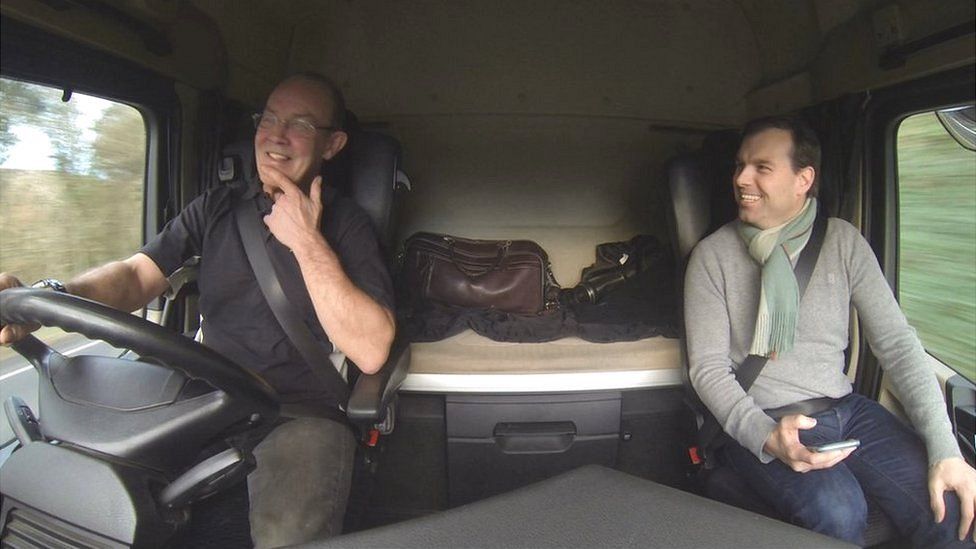How will Brexit affect the port of Cairnryan?
- Published

William Gunn — known to his friends as Billy — is rattling along the A77 in a lorry packed with aluminium, heading for the ferry at Cairnryan.
He may know this road better than anyone, having made the trip from Glasgow to Belfast and back more than 2,000 times over the past 44 years.
"Doesn't bear thinking about" he laughs. "Always on a Wednesday. Back on a Friday."
Happily Billy, 62, likes driving on a route which many people in south-west Scotland curse for its narrow lanes, tight curves and dangerous junctions.
It's a clear run today but Billy fears that Brexit will clog up the ports and the roads.
"I would imagine there would just be tailbacks of traffic," he says. "They'll be queuing on the streets probably."
So how might that happen?
Billy's weekly journey takes him on the shortest route across the Irish Sea from Cairnryan to Belfast.
Another busy passage runs from Holyhead, on the Welsh island of Anglesey, to Dublin but if Brexit were to lead to customs checks there, then more hauliers may choose to head north to Dumfries and Galloway to enter Northern Ireland instead.
Of course all of this is conjecture but that is the problem with Brexit. Nobody, from the prime minister down, seems to have a clue what is actually going to happen, leaving businesses and individuals alike struggling to plan.
Ian Hampton, a senior executive at Stena Line, the largest ferry operator in the North Sea told BBC Scotland's The Nine Brexit may well affect the flow of trade.
"There are a lot of goods that flow up and down the isle of Ireland," he says.
"They take different routes to and from the United Kingdom, the mainland, so a decision on where that border could be could actually change the way trade moves."
Mr Hampton has even suggested that supplies of food and other goods might run short.
"On shortages, look it's a potential," he told The Nine news programme on BBC Scotland.
"Goods will inevitably require checks as you move to being a third party country to the EU so therefore it could inevitably create delay."
In Cairnryan, Lee Medd, business development manager at the Dumfries and Galloway Chamber of Commerce is more upbeat.
He evinces a mixture of concern about increased traffic on the roads — everyone here is worried about the roads — and optimism about the prospects for the UK outside the EU.
"I think to be honest we will see a much increased flow of traffic coming in and out of this port. It's already got a lot of traffic coming in from Ireland but it's going to be seen as the easy option," he says.
"Business happened around the world before we were part of the European Union," he points out.
"People have always wanted to do business with Britain. Britain has always wanted to do business with other people around the world. That will continue. Let's just crack on with it. This could be the best thing to happen to the United Kingdom."
Romano Petrucci, who runs the Central Cafe in Stranraer, which has been serving up fish and chips for six decades, does not share that optimism.
Cairnryan is a tiny place with little infrastructure and few places to park so any overflow would put pressure on larger Stranraer, still smarting from the decision to move the port out of the town after 150 years.
Stranraer itself is capable of coping, says Mr Petrucci, indeed he would be delighted to see queues of hungry lorry drivers but he believes the roads would struggle to cope.
"We've been completely and utterly abandoned for the last 20 years," he says. "We're the only place that doesn't have any dual carriageway for 50 miles in Scotland and yet we're a major port. So no we're not ready."
Some residents here say they are not convinced that the authorities are ready either. They have accused Dumfries and Galloway Council of failing to explain its plan for Brexit.
Martin Ogilvie, resilience manager for the council, says the criticism is not entirely unfair, explaining that the uncertainty meant they had taken a decision not to scare people with speculation.
But, he insists, they are prepared.
"There are plans already to stack up the vehicles on certain roads through just outside Stranraer," he says.
"It's almost like a rolling queue but we can't have these queues blocking the main trunk roads."
The council, he insists, is developing options to get the traffic off the main roads and find somewhere safe to queue. One option is to use the old pier in Stranraer.
Back in his lorry, still moving for now, Billy is disgruntled about the whole affair.
The referendum campaign, he says, did not do much to inform the public about what would actually happen if the UK voted to leave the EU.
"We were not told a great deal about it," he says.
"Nobody even tried to explain the full consequences."
"Even to this day, I don't think folk truly understand the full consequences of leaving Europe."
- Published18 November 2011